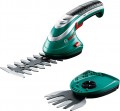Pole length
The length of the bar usually refers to the total length of the brush attachment or saw blade (see Attachments) supplied with the hedge trimmer. The
longer the tire, the longer the cut that the tool can make at a time. In general, it is believed that a short length is typical for entry-level tools, while professional ones are equipped with larger attachments. However, here you need to take into account that the choice depends not only on the scale, but also on the specifics of the intended work: long attachments are less maneuverable and less suitable for topiary trimming of bushes. In addition, the cost of a brush cutter also largely depends on this parameter.
Tooth pitch
The distance between the individual teeth of the shrub attachment (see "Tips") supplied with the tool. The
larger the pitch of the teeth, the easier the tool will cope with thick branches, however, the quality of the work will be quite rough. Conversely, more densely spaced teeth work "cleaner" but are less suited to tough conditions and large branches.
Stroke frequency
The frequency of movement of the teeth in bush or grass attachments (see "Tips"). The design of most of these tools is such that for one revolution of the engine, the teeth make one complete cycle of movement back and forth; therefore, the stroke rate is usually determined by the speed of rotation of the engine and is indicated in revolutions per minute.
It is believed that the quality of the tool’s work largely depends on this parameter: the more often the stroke, the cleaner the cut will be. Ratings up to 2200 rpm are usually typical for entry-level devices, up to 2800 rpm are average, and advanced models can have speeds of 3400 rpm and even higher.
Battery
Features of the battery-powered hedge trimmer. Most devices out of the box have
one battery. But there are models that are equipped with a replaceable battery (
2 batteries included). This solution allows you to extend the operating time of the device by replacing a discharged battery with a charged one. And
the absence of a battery in the kit will be appropriate if you buy a hedge trimmer, which is suitable for a universal battery from other devices of the brand. Or you yourself want to choose a model with the required capacity. And for low-power devices there is
a built-in battery.
Battery voltage
Operating voltage of the battery in a battery-powered hedge trimmer (see above). This parameter is usually selected by the manufacturer according to the characteristics of the engine: the greater the power, the greater, the battery voltage is likely to be. In fact, voltage data may be needed only if the battery fails and it will be necessary to replace it with an equivalent one. In addition, there are formulas that allow you to roughly estimate the battery life depending on the battery voltage, its capacity and the power of the tool; they can be found in special sources.
Capacity
The capacity
of the battery that comes standard with the battery-powered hedge trimmer (see above). Expressed in amp-hours, one ampere-hour means that the battery is capable of delivering 1 amp for 1 hour.
Last but not least, the battery life of the tool depends on the capacity of the battery. However, it is impossible to directly evaluate the battery life of a brush cutter by this parameter: the fact is that it depends on a number of other factors, ranging from engine power and battery operating voltage to the degree of complexity of work and contamination of the nozzle. Therefore, it makes sense to compare different models with each other in terms of battery capacity only if they do not have significant differences in other characteristics. But at the same time,
brush cutters with a capacious battery a priori allow the device to work more.
Operating time
The maximum time for which the cordless hedge trimmer can work without additional charging. Note that the maximum period is indicated, which is often overestimated by the manufacturer and is calculated at idle. Under load, this parameter will be less.
Charging time
The time it takes to charge the brush cutter battery from 0 to 100%.
Weight
The total weight of the brush cutter. Usually indicated for a fully equipped tool, with an attachment installed and, in the case of a petrol engine, a full tank of fuel; however, there may be exceptions. Usually, the relevant data is indicated in the official documentation.
This parameter is important, first of all, taking into account the fact that the tool during work will have to be kept on weight most of the time. Accordingly, the lighter the brush cutter, the longer you can work with it without interruption, the less often you have to rest. On the other hand, a large weight also has its advantages: a heavy tool is more stable and does not “tear out of hand” as much under high loads on the nozzle.

